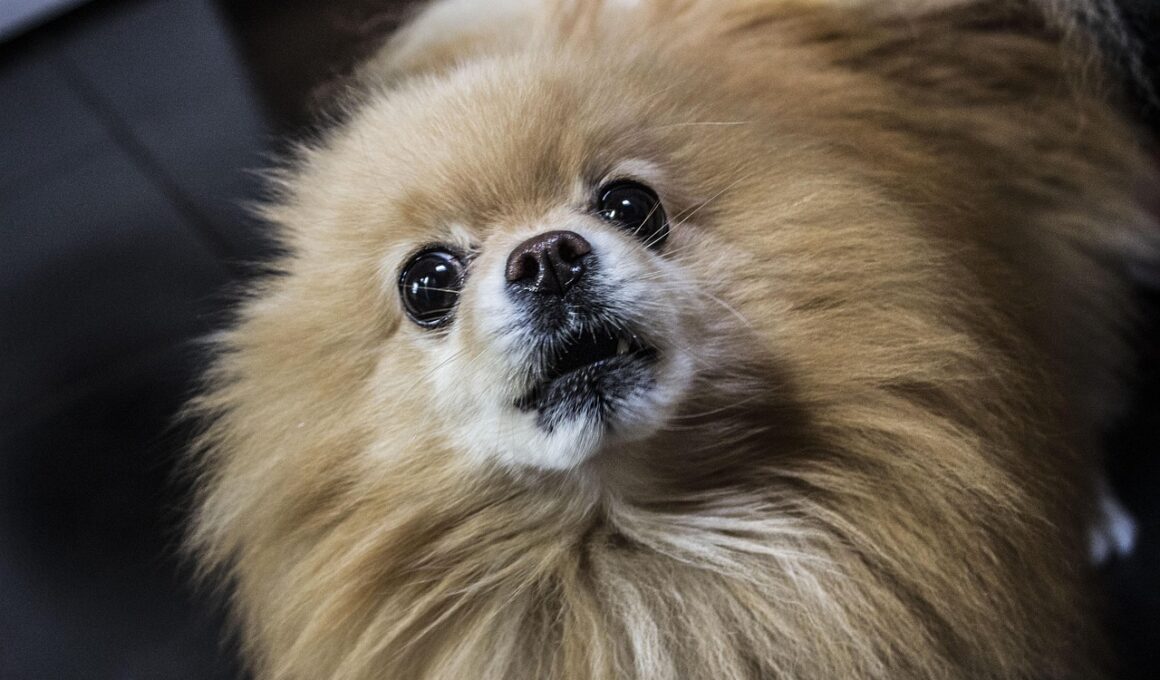The Connection Between Play Aggression and Anxiety in Dogs
Play aggression in dogs is a common behavior that often arises during playtime; however, its connection with anxiety is critical for understanding dog behavior. Dogs that exhibit this type of aggression may appear overly excited and can become aggressive towards their playmates, whether they are human or canine. This situation often stems from nervousness or insecurity in the dog, coupled with the natural instinct to assert dominance during play. It’s essential for dog owners to recognize these signs early on. Symptoms can include growling, snapping, or excessive chasing. These behaviors might indicate that the dog is feeling overwhelmed. Anxiety-driven play aggression can also manifest as a sudden decrease in playful behavior or the refusal to engage in social interactions. Addressing underlying anxiety can help mitigate these aggressive tendencies, creating a safer environment for both the dog and those around it. Behavioral training and desensitization processes can be greatly beneficial. Understanding the causes of play aggression undeniably helps in efficiently managing it, leading to a happier, more balanced, and well-adjusted dog. Owners should prioritize preventive strategies and seek expert advice when necessary.
Since anxiety often plays a significant role in shaping a dog�27s behaviors, it is important to explore various factors that contribute to this condition. A stressful environment, lack of proper socialization, and even past traumatic experiences can lead to feelings of anxiousness. These aspects can severely impact the play dynamics between dogs, causing play aggression during interactions. Moreover, recognizing triggers, such as loud noises or unfamiliar environments, can greatly assist owners in understanding their dog’s reactions. Some dogs may also exhibit play aggression when they feel threatened or cornered despite being in a playful context. Owners should be particularly vigilant during playtime to ascertain the level of comfort their dog shows with playmates. Managing the environment, providing safe spaces, and gradually introducing new experiences can counteract anxiety-related issues. Positive reinforcement and structured play sessions can foster healthier interactions and contribute to a more relaxed demeanor. Doing so will not only help alleviate anxiety but will also diminish episodes of play aggression, allowing dogs to enjoy playtime as intended. Therefore, addressing anxiety is crucial for nurturing well-socialized and emotionally stable dogs.
Understanding Play Behavior and Its Connections
Grasping how dogs play is essential for pinpointing the factors influencing play aggression. Play among dogs mimics hunting behavior, including stalking, pouncing, and chasing. However, when anxiety arises, this play behavior might escalate into aggression, making it critical to note the changes in their body language and vocalizations. For instance, dogs may bark, posture aggressively, or exhibit stiffness when feeling nervous. In contrast, a relaxed dog will display loose body language and be more open to engaging in friendly interactions. Owners must remain attentive to their dogs watching for sudden changes during playtime. Consistent interaction with dogs significantly reduces anxiety, hence promoting positive play behavior. Addressing their anxiety while participating in various play scenarios makes it easier to analyze how the dog responds to different playmates. Appropriate socialization at an early age fosters healthy development, which involves exposure to diverse environments and experiences. Through controlled interactions, anxious behaviors can be mitigated, promoting an emotional balance. Regular training sessions not only improve play skills but will also enhance owners’ understanding of their dogs. Keeping a watchful eye on play behaviors ensures joyful experiences for dogs and their companions.
The significance of managing play aggression cannot be overstated, as it also pertains to the overall emotional well-being of the dog. Dogs that frequently display aggressive behaviors during playtime are often at risk of becoming isolated or facing heightened stress levels. Developing strategies to manage such behaviors positively impacts the dog’s ability to enjoy social interactions. Furthermore, understanding the link between anxiety and play aggression fosters a more compassionate approach from dog owners. Instead of disciplining dogs harshly for their behaviors, it is more effective to redirect their energy towards positive play activities. Engaging in calming exercises or providing toys that encourage independent play can assist in alleviating anxiety. Owners should also consider including structured playdates with compatible canine companions, promoting healthy social skills and enjoyable interactions. As anxiety diminishes, play aggression will likely subside, resulting in more harmonious relationships between dogs and their peers. Thus, prioritizing emotional assistance and behavioral training proves essential in promoting better play experiences. Enhanced socialization benefits not only the anxious dog but also contributes positively to the overall dog community, encouraging acceptance and growth.
Approaches to Reducing Play Aggression
Several techniques can be employed to help alleviate play aggression among anxious dogs. First and foremost, understanding your dog’s body language can be crucial. Reassuring an anxious dog through calming words or slow movements prevents escalating situations. Introducing relaxation techniques, such as calming scent diffusers or music, can also assist. Another approach is implementing consistent training exercises. Teaching basic commands helps establish boundaries during playtime, and this benefits their self-control. Using downtime as part of training ensures that dogs recognize when it is time to play versus when to settle down. Adding structure and routines during play can create a sense of security and predictability for anxious dogs. Implementing controlled play sessions with established playmates helps dogs learn safe interaction methods. Gradually increasing exposure to various environments and experiences elevates their confidence and reduces anxiety. Building positive associations with various stimuli can also mitigate anxiety-driven aggression. Keeping communication open with fellow dog owners fosters a supportive environment and enhances learning opportunities. Taking proactive steps significantly contributes to better emotional health, ultimately allowing dogs to enjoy their playtime without fear.
Another essential aspect of mitigating play aggression and anxiety involves creating a safe space for dogs to retreat. Just as humans need a sanctuary from stress, dogs too require a comforting environment. Whether through establishing a designated quiet area at home or utilizing a crate, giving dogs the option to decompress can be beneficial. Monitoring play sessions while intentionally allowing breaks helps dogs better gauge their energy levels and emotional states. Engaging in games that promote self-assurance, such as nose work or hide-and-seek, can boost confidence while keeping play enjoyable. Ensuring consistent routines will help build a sense of stability in dogs’ lives, thereby lessening anxiety levels. When dogs feel secure in their surroundings, their capacity to engage positively in play increases. Additionally, providing opportunities for individual playtime allows dogs to explore and expend energy without feeling overwhelmed by group dynamics. Seeking support from professional trainers or canine behaviorists can deliver further strategies tailored specifically to individual dogs. By actively employing various techniques, dog owners demonstrate a steadfast commitment to the mental and emotional health of their pets. Ultimately, such efforts pave the way for happier, healthier dogs.
Long-Term Solutions for Healthy Play
Over time, effectively managing play aggression requires a combination of commitment and understanding from dog owners. Establishing clear boundaries and maintaining consistency in training can significantly influence behaviors over the long term. Investing time in obedience training creates a solid foundation for dogs, enhancing communication. Additionally, engaging in regular socialization with diverse dogs encourages adaptability and resilience. This approach fosters positive associations with various settings, enriching a dog�27s potential experiences. Alongside training, considering a dog�27s physical and mental well-being plays a critical role in growth. Regular exercise meets the dog’s physical needs while stimulating their minds through interactive toys or problem-solving games. Encouraging positive play behaviors through supervised sessions ultimately nurtures healthier relationships among dogs. Note that seeking assistance from professionals should not be viewed as a sign of weakness. Instead, it reflects an owner’s dedication to their dog’s well-being. By investing time and effort in addressing play aggression and anxiety, pet owners can create long-lasting positive outcomes. Understanding these connections enhances not only play but the overall bond between dogs and their human companions.
In conclusion, recognizing the intricate relationship between play aggression and anxiety in dogs allows owners to take proactive measures to ensure their pets’ mental well-being. Awareness of behavioral cues enables owners to address anxiety effectively, creating a more harmonious atmosphere during play. Moreover, employing various strategies, such as training and appropriate playtime structures, enhances social skills while mitigating aggressive behaviors. Practicing patience and understanding as a dog navigates social interactions leads to healthier relationships and a happier canine. Additionally, creating supportive environments will help reduce anxiety-related tendencies, promoting overall emotional health. Seeking professional assistance when needed should be prioritized, as it fosters better communication and establishes safe avenues for play. Ultimately, committed involvement and conscious actions from owners contribute significantly to achieving delightful play experiences. Understanding the roots of play aggression, coupled with practical approaches to managing it, will build stronger bonds between dogs and their families. Thus, promoting well-adjusted, playful, and confident dogs provides ample joy for both canines and their humans; everyone benefits from a supportive and enriching environment together.


